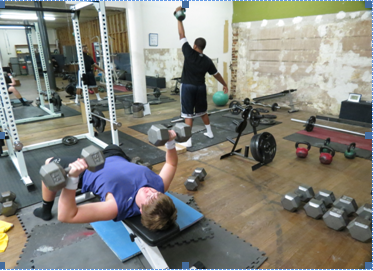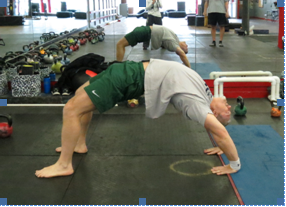Bench Press: Good, Bad, or Ugly?
Russell Andrews, BS, DC, HKC, FMS, SSC.
April 17, 2013 01:01 PM
Back in the Old Timer days, the power clean was the staple lift that measured the strength and power of Athletes. For some unexplainable reason, the bench press replaced the PC as the measuring stick for gauging athletic strength. Guys just love to bench. For obvious reasons, the bench is an important exercise for the body building and power lifting culture.
Is the bench press good, bad, or ugly for athletic training in the common sports, such as football, basketball, baseball, etc.? In reading the books written by the expert trainers, the bench press is the first exercise mentioned in most books and it is the exercise that sets the tone for most
strength and conditioning programs.
For football players, the bench will add bulk to the frame and will build a solid cosmetic look. Coaches, from almost every team across the landscape of sports, insist their player’s bench and max out on the bench. For reasons unknown, many Coaches equate having a heavy bench to building athleticism and winning. Are we trying to create
Power Lifters, Body Builders, or Athletes?
When I was a "gym rat", the bench was the first exercise on Monday and Thursday workouts. I wanted the big chest, the tight shirt, and to feel the "pump" when I was finish with all the sets and reps. Looking back, I didn't gain one bit of athleticism by bench pressing. Working my pec muscles didn't increase my speed, leaping, quickness, movement, flexibility, or athletic ability. You may agree or disagree with this statement...
The bench press is the most overrated exercise in the weight room.
Yet it is the most performed exercise, the most talked about, and the most comparative between gym rats. Yes, Athletes need to work the pecs for upper body strength and to add bulk to the frame because no area of the body should be ignored in athletic training. What is difficult to accept is the priority that is placed on the bench press. Especially since this exercise is one of the least "functionally" developing exercises that increases athleticism and movement strength. An Athlete can skip doing bicep curls and not loose his athletic advantages. The bicep gets included in pulling exercises and body weight. The pecs get included in many body weight exercises also. Athletes can skip the bar bench press and never miss a beat. Isolating the pecs, even with heavy weight, is still isolation.
In my training of middle and high school Athletes, I don't use the bar for the bench. Instead, I use the dumb bell bench press. I program chest work once a week. There are too many strength movement exercises that build athleticism more effectively than lying on the back and pressing.
The dumb bell press has more benefits than the bar bench press.
Many Athletes are unbalanced in strength and function. Since each arm has to work independently holding the bell, the weaker side has to engage, stabilize, and lift the weight.
The exercise allows for a deeper range of motion.
The center of gravity is in the handle of the bell. The distribution of the weight is in close proximity to the COG resulting in lifting more of the actual weight of the dumb bell. (The weight on a bar is displaced away from the COG.)
Athletes can still bulk, build strength, and will balance side to side strength more effectively with dumb bell pressing.
If you are strong on the bench, it means you are strong on the bench.
Recently, before a workout with a high school baseball player, he stated he was sore from having to max out on the bench. He benched 275. The lift was not clean and smooth. He bridged while one arm locked first and the other arm waggled up. We've all seen this one arm worm bench press. The lift would not have counted. His name is on the wall chart in the high school gym at 275. His true bench weight is closer to 235-240.
My questions to him:
Me: "Why did you have to max for baseball?"
Him: "I don't know."
Me: "Can you bench 250 for 2 solid reps?"
Him: "I'm not sure, never tried it."
Me: "Can you do 225 for three good reps?"
Him: "I don't know, I might could…yeah I think so."
This Player has a large gap from 225 to 275 where there is no workable strength.
What was the point to maxing? Will he hit a baseball better? Will he field better? Throw better? Be faster on the base paths? This player got very little benefits for maxing on the bench. What would serve this Athlete and many others that are "trapped" under the bench press bar is to develop his movement strength, flexible strength, and cardio stamina. He would be well served to work on full body strength, quickness, explosion movements, flexibility, and balance. He gets none of these listed attributes of athleticism from the bench press. The work is more important than the weight.

When I look at pictures of the
Russian Strongmen of old, the pecs are the least noticeable muscles on these powerful Architects of athletic training. What catches the eye are oak size legs, steel plated abdominals, bowling ball shoulders, and well developed arms. The pecs are not the feature. These Warriors possess an athletic look and I imagine most were very athletic. Today’s Athletes seem to chase the cosmetic body building look. That look may or may not improve athleticism.
The pecs are powerful stabilizers for the upper torso, shoulders, and lats, therefore conditioning them is a necessity. Since every sport engages the musculature of the shoulders, upper back and lower back, hip-thigh-core complex, the foot and ankle, it’s these areas that are of prime importance in athletic training. Whether the bench press is good, bad, or ugly, let's lower the premium placed on the bench press and put athletic training priority in its proper order, the bench press should be last on the list.
 Russell Andrews is a Chiropractor, certified in kettlebells, functional movement and strength and conditioning. Russell’s focus is training young athletes. He maintains Thunder and Lightning Performance Training in Georgia.
Russell Andrews is a Chiropractor, certified in kettlebells, functional movement and strength and conditioning. Russell’s focus is training young athletes. He maintains Thunder and Lightning Performance Training in Georgia.
He is a speaker for the Glazier Clinic speaking on the topics, Building the Movement Athlete to Improve Performance, and, Movement Training for the High School Athlete.
He has over 35 years experience as a lifter and over 25 years as a trainer. He also maintains a private Chiropractic service and can be reached at www.drruss21.com.
Back